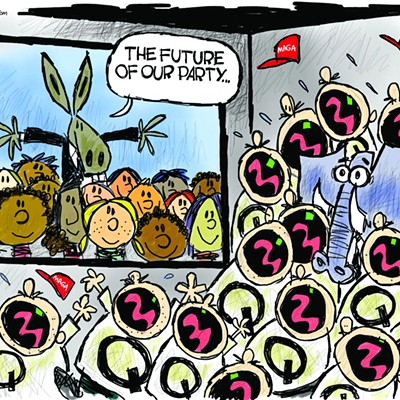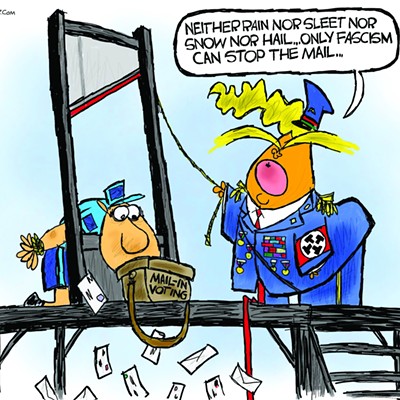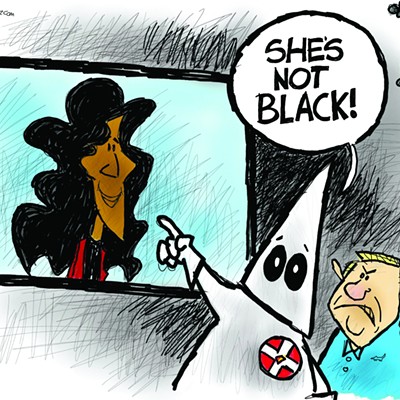Prezelski's seatmate, Rep. Linda Lopez, is running unopposed for the state Senate seat being vacated by Democrat Victor Soltero, leaving an open seat in the southside district that has attracted more Democratic challengers than any other seat in Arizona.
The candidates don't differ much on the core issues. All of them promise to fight to improve education, health care and transportation, although they differ on the specifics.
Despite the crowded field, Prezelski has been surprisingly slow in his campaign. He only received his Clean Elections campaign funds last week, even though early ballots started going out to more than 7,200 Democrats in the district on July 31. Three of his opponents qualified before he did, and the other three appear unlikely to qualify at all. Without the cash, Prezelski was unable to send mailers, put up signs or even pay for campaign propaganda he could hand out while walking door to door.
Still, Prezelski has some big names in his corner. He's been endorsed by the Arizona Education Association, the AFL-CIO, Gov. Janet Napolitano, Congressman Raul Grijalva, Pima County Supervisor Richard Elías and local musician Al Perry. Prezelski is counting on voters recognizing his experience.
"I've been fighting for Tucson," Prezelski says. "I know how to get things at the Legislature, and that's what I've been doing."
At least three of Prezelski's opponents, however, are running aggressive campaigns that could knock him out of office in the Sept. 2 primary.
Take Matt Heinz, a Tucson Medical Center physician who made his first run for office in midtown's Legislative District 28 two years ago. Heinz was the first Democrat in the state to qualify for Clean Elections funding back in March. He's also scored endorsements from the Arizona Medical Association, the Arizona Nurses Association, the Professional Fire Fighters of Arizona and several unions representing government workers.
Heinz wants to expand health coverage, educational spending and investment in clean energy. He's spent the last few months walking door to door and sending layers of literature. Since early ballots started arriving in mailboxes in early August, he and his campaign team have been calling hundreds of voters per day.
"I'm hoping to use my training, my degree and the letters after my name in a way to leverage, hopefully, something good for Southern Arizona and for the district," Heinz says.
Then there's ecologist Daniel Patterson, who has built his campaign around support for education, the environment and economic development. Patterson has also been picking up endorsements, from the Arizona Education Association, the Pima Area Labor Federation and the Arizona League of Conservation Voters. In addition to walking door to door, the local blogger has been campaigning aggressively on the Internet, with regular updates on his campaign page, regular posts at local political blogs and mass e-mails whenever he scores a new endorsement.
"I've got a proven record of community and public service in District 29 and Tucson," Patterson says. "I've been in the district for a long time, a lot longer than some of the other candidates, certainly, and I know how the Legislature works."
Another Democrat with more than $19,000 in Clean Elections funds to spend is Ephraim Cruz, a former Border Patrol agent who was forced to resign after he beat federal charges that he illegally helped a Mexican national cross into the United States. Cruz describes himself as a "federal whistleblower" and says the charges came in retaliation for his report that detainees in Border Patrol custody were being abused.
Cruz hopes to use his experience in law enforcement "to represent and invoke the interests of the entire district, not just select neighborhoods."
Cruz, who qualified for Clean Elections money just as early voting began, is running what he calls a "saturation campaign." He's put up signs across the district, has radio ads in both English and Spanish, and has done a lot of door-to-door canvassing. He has endorsements from "ordinary folks in the community who have done extraordinary things," including Democratic activist Bob Schwartz, who pushed the Arizona Minimum Wage Initiative; retired Brig. Gen. John Adams; and Clarence Boykins, the executive director of the Tucson-Southern Arizona Black Chamber of Commerce.
Cruz says he decided to run for office while volunteering for Democrat Barack Obama's presidential campaign; before that, he had only voted three times in the decade he's lived in Arizona. (He says it took him years to understand the political landscape of Arizona, and that the "tumultuous nature" of his life kept him from voting.)
The other three candidates have mostly remained under the political radar screen. Patricia Puig, who is making her second run in Legislative District 29 (she came in fourth in the four-way primary in 2006), has managed to nab the golden endorsement from Congressman Raul Grijalva and has been walking door to door, but she has stumbled during her public appearances, such as the LD29 Clean Elections debate.
Puig, whose campaign is focusing on improving education and preventing animal abuse, has not yet qualified for Clean Elections funding.
Eric Carbajal Bustamante, a physical education teacher at a charter school, is making his first run for office at age 24. Bustamante is another candidate who stresses the importance of funding education, but he's come across as unprepared and vague in public settings. He has not yet qualified for Clean Elections, although he has been collecting $5 contributions (and the deadline for those contributions is Aug. 21).
The final candidate, Gil Guerra, a precinct committeeman, missed the LD29 Clean Elections debate because he couldn't get time off from his job as a custodian at the UA. As a result, he was disqualified from receiving Clean Elections funding, although he has continued a door-to-door campaign out of his own pocket.
The two winners of the Democratic primary will face Republicans Juan Ciscomani and Pat Kilburn in the general election.












